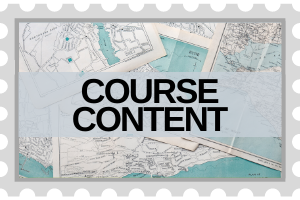
While study abroad can advance intercultural competencies, students often face difficulty articulating transferrable intercultural skills, and explaining to prospective employers how their international experience sets them apart. This can be particularly challenging for students in underrepresented groups with unique experiences including, first-in-the-family, LGBTQ2S+, BIPOC, and those with disabilities. Thus, the development of an innovative re-entry program, that integrates post-experience reflection, will allow students to critically assess their mobility experience from a professional development and intercultural lens. In honing their skills, this program prepares students to succeed in a rapidly changing and increasingly international labour market.
The course was created by CIP with research assistance from the Community Engaged Scholarship Institute (CESI) and course design support from our Open Learning and Educational Support Unit (OpenEd). This project was funded through the Government of Canada Outbound Student Mobility Pilot Project.
Find Out More:
If you would like to find out more about the research behind our course design or the content we have included, please use the buttons below to find the information you are looking for.
 [1]
[1]
 [2]
[2]
You can download a pdf version of the research and course content material here. [3]
Check out our Re-entry Webinar:
The CIP, CESI, and OpenEd team presented a webinar about the re-entry program that we created. If you were unable to attend the webinar, you can view the recording below.
Webinar FAQ
This course is designed for students who participate in any type of international experience. We will automatically enroll students that we know about (which should be most because of the pre-departure requirements), but others can request to be a part of this course.
Students will have access to this course for up to one year and will be grouped into cohorts based on when they return.
Students will not be able to access this course once they graduate, however, there are worksheets in the course, which they can download, fill out, and keep for their own reference as they apply for jobs.
We estimate that it will take students roughly 3-5 hours to complete the course. They will have access to the course for up to one year, which will give them the flexibility to complete the content at a time that is convenient for them.
While completion of the course is not mandatory and there is no degree credit awarded, students will receive a badge upon successful completion of all course requirements.
We are hoping that since students have been asking for this, they will find it valuable and be self-motivated to complete the modules. And the completion badge may help as well.
We also incorporated videos and interactive activities to help engage students with the content. And are hoping to adapt our current in-person sessions (when the situation allows) to better meet the recommendation that returning students are keen to connect and share their stories.
Since the students will be enrolled in and completing the course on their own schedules, students' reflection or work will not be graded/assessed.
Additionally, the literature review suggested that when students are graded on their reflections they try to give the 'right answer'. Therefore, we felt that not grading the reflections may also provide the opportunity for the students to have a more honest reflective experience.
The discussion forums and topics are already set up for students, and the CIP team is able to moderate and evaluate whether there are new topics needed. We used the feedback from our interviews and surveys to determine which initial discussion boards/micro-communities were needed.
Posts don't have to be approved before they are posted, but there is a periodic review to ensure that posts are appropriate.
Students are also provided with etiquette rules at the beginning of the course that applies to the discussion section.
The literature suggested that learning is an active process that can be constructed and facilitated. Hence, the learnings for students upon re-entry can be maximized if they are guided through the reflection process. We cannot assume that because students have been through the international experience they automatically gained the transferrable skills. Literature suggested that students also need to develop the language to identify and articulate the skills they gained. For example, students may have demonstrated adaptability during their international learning but they also need to learn how to communicate this experience to others or employers in terms of transferrable skills.
With research assistance from CESI and course design expertise from OpenEd, it took the CIP team roughly four months to create this program.